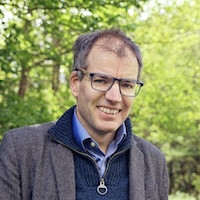Biology is the study of the living world. It includes ecology, taxonomy, botany, zoology, palaeontology, biogeography, microbiology, glycobiology, cell biology, molecular biology, evolutionary biology, marine biology, genetics, and many other sub-disciplines.
Biology is a source of wonder and fascination, from the fossils of extinct mega-fauna to the sub-microscopic structures of enzymes. The study of biology helps us understand how to responsibly steward the living world, to the benefit of all living things, including human beings.
There is huge Christian motivation to be a good biologist. Christians know that the living world was created by God, and He upholds it by His power. Naming, nurturing and tending the living world is one of the most basic tasks that God has given to human beings. Biology gives evidence for God’s eternal power and divine nature. Rightly understood, biology will bolster your faith and give you many opportunities to express your faith and witness to it.
Working for the wellbeing of creation
There are few academic fields that are so directly concerned with the wellbeing of creation as biology. How do we conserve rare species? Prevent infectious disease? Reforest deserts? Feed the world? Digest waste? These are all practical questions that biology seeks to answer. Biologists can have a real impact for the good of the world around them. For the Christian, this is motivated by the creation mandate given to Adam, and by the knowledge that Jesus Christ is Lord of all. As they name species, decode DNA, model communities, and combat extinction threats, biologists are doing a job that God created us for. This is a great encouragement to me as I do my research on how trees can cope with pests, pathogens and climate change.
In wider culture, biology is a subject which many people look to for answers to deep philosophical questions. What is life? Where do we come from? Why are we here? Where are we going? Biology alone cannot answer these questions. But biological data is often interpreted to the public by scientists with an atheistic worldview. They claim that we got here by a purposeless natural process, that life is ultimately meaningless, and that our destiny is eternal darkness. In my experience, research biologists cannot talk long about their data without using language that implies purpose. We need Christian biologists who can give a Christian interpretation of the data: biology gives evidence of purpose and points us to a divine mind who intended us to be here.
Even atheists acknowledge this to some extent. “Biology is the study of complicated things that give the appearance of having been designed for a purpose,” wrote Richard Dawkins [1], in a book that attempts to explain away this appearance of design, via neo-Darwinian mechanisms. His attempt is unsuccessful, and if you study biology, you should be well equipped to understand why.
In one analogy, he evolves the phrase “ME THINKS IT IS LIKE A WEASEL” by random mutation. However, Dawkins does not require every intermediate stage to be functional. To be biologically realistic his analogy should require each intermediate to be a meaningful series of words. Dawkins fails to provide a convincing naturalistic explanation for the “appearance” of design in the living world.
Worshipping the God we work for
Biology is worthwhile, joyful, beautiful, and leads us to worship our good and wise God. When I submitted my DPhil thesis to the examination board, I placed in the front some words written by John Ray, a seventeenth century pioneer of modern science: ‘There is for a free man no occupation more worthy and delightful than to contemplate the beauteous works of nature and honour the infinite wisdom and goodness of God’. That was my experience in doing my doctorate.
This conviction is of course found in the Bible. ‘I praise you, for I am fearfully and wonderfully made. Wonderful are your works; my soul knows it very well.’ (Psalm 139:14). ‘O Lord, our Lord, how majestic is your name in all the earth!’ (Psalm 8:9). ‘Consider the lilies of the field, how they grow: they neither toil nor spin, yet I tell you, even Solomon in all his glory was not arrayed like one of these. But if God so clothes the grass of the field, which today is alive and tomorrow is thrown into the oven, will he not much more clothe you, O you of little faith?’ (Matthew 6:28-30). The living world teaches us that God is wise and good.
Today, our opportunities for wonder and worship are constantly increasing. John Ray and the psalmist had no knowledge of the biota of deep-sea vents, the complex nano-machinery found in every cell, nor of the coded information in DNA. The ongoing discoveries of biology constantly give us fresh evidence for God’s wisdom and goodness.
Sadly, as we study biology, we also come across much that is wrong in the world. The living world is also teaching us that rebellion against God ruins everything. As we see suffering and death, we see that the living world is in “bondage to corruption” and is “groaning” (Romans 8:21-22). The whole of creation is eagerly waiting for the coming glory (Romans 8:18) to be revealed at the final judgement day (Romans 2:5-10).
As a Christian biologist, your relationship with God will be strengthened and deepened as you hold your Bible in one hand, and your biology textbook in the other. By prayerfully studying God’s word and his works, you will grow as both a Christian and a scientist.
Witnessing to the world
By itself, biology cannot tell us the gospel: ‘For God so loved the world, that he gave his only Son, that whoever believes in him should not perish but have eternal life.’ (John 3:16). We need God’s special revelation in his Son to tell us that. But biology does shed light on truths that are foundational for the gospel, especially God’s existence.
Studying biology can equip you to argue against atheism. You will need to think for yourself a great deal as many of your lecturers will be teaching biology from an atheist perspective. For them, a starting assumption will be that God can never be invoked as a cause. You will need to learn weigh up the evidence for yourself. This won’t always make you popular, but it will make you a better-informed Christian and a better biologist. It will give you the chance to have many conversations and develop the expertise to defend your faith in new ways.
Several years ago, I was quizzed about my Christian faith during a job interview for a lectureship at the University of Cambridge. I pointed out that Christian biologists are more open-minded than atheist ones. For the atheist, any given biological entity MUST have evolved by an unguided process. For the Christian, it might have done, or it might not. The Christian is therefore in the business of weighing up the evidence. This makes for better science. I didn’t get a convincing counter-response, but I didn’t get the lectureship either.
It's not just the things we say that can be a witness to the world, but also the things we do. Every Christian student should work hard, never cheat, never make up results, and never secretly use AI to write an essay (unless AI is specifically allowed for certain exercises).
Some of your fellow students may have never met a Christian before, and you may need to break down some of their stereotypes. This may be particularly true of environmental issues. You will meet many people during your studies who have a moral conviction that studying biology is the right thing to do in the light of the biodiversity crisis. They may think that Christianity is part of the problem, as it taught people to exploit the planet unsustainably. It could be a revelation to them to know that you are motivated by your Christian faith to study biology and believe that the Bible teaches responsible stewardship of the living world.
Keep going, Christian biologist!
I hope this encourages you to study biology, and to do so enthusiastically and critically. What you learn about the living world will strengthen your faith, given you a bigger view of God, and equip you to play your part in the stewardship of creation. If you are taught biology in a university dominated by naturalistic assumptions, this will teach you to think and explore data for yourself. You will often have to pray for wisdom and insight. It will not always be easy, but it will always be interesting. Where there are struggles, they will end up deepening your faith and making you a better scientist. Every generation needs Christian biologists. Biology needs them too.
Reflect and discuss
Think: Think back over what you have studied so far in your degree. Where have you seen God's fingerprints? Where have ideas presented to you challenged what you believed to be true?
Live: What do you think your coursemates would know about what is important to you from the way you live? Is there anything you want to change here?
Speak: Are there topics in your subject that are closer to talking about your outlook on life, God or the gospel? Pray for people on your course and for opportunities to share about Jesus with them this term.
Taking it further
- UCCF Science Network resources
- God’s Undertaker: Has Science Buried God?, John Lennox
- The Environment, Dave Gobbett
- Undeniable, Doug Axe
- 'Did Darwin make atheism credible?'
References
[1] Richard Dawkins (1986), The Blind Watchmaker: Why the Evidence of Evolution Reveals a Universe Without Design

